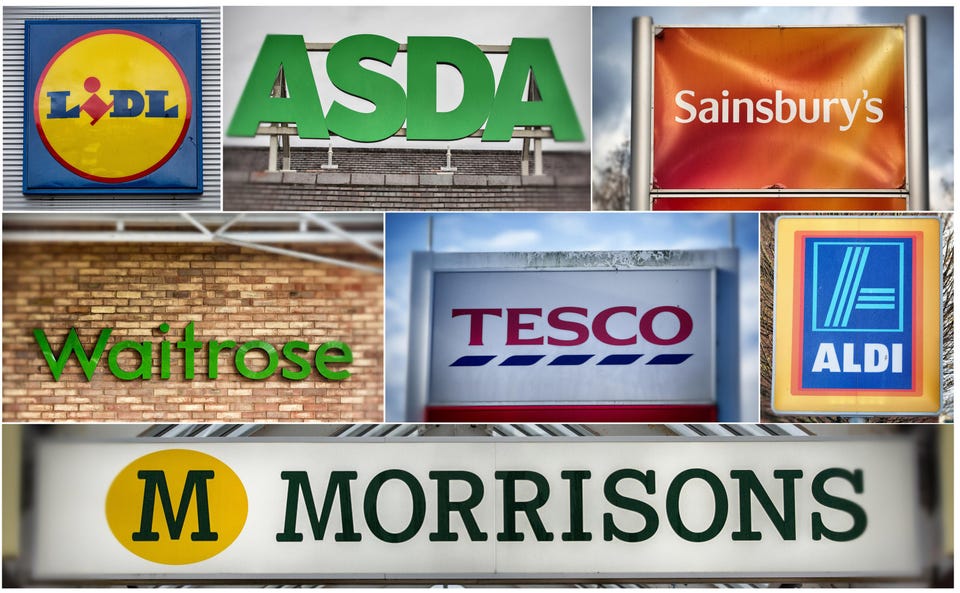Retail Aldi On Track To Join ‘The Big 4’ UK Grocery Brands By 2023 Kate Hardcastle Contributor Opinions expressed by Forbes Contributors are their own. Reporting on global trends, consumer insights & business with passion New! Follow this author to improve your content experience. Got it! Jun 30, 2022, 02:06am EDT | Share to Facebook Share to Twitter Share to Linkedin Aldi, the German discount supermarket chain that alongside Lidl has disrupted UK grocery shopping .
. . [+] over the last decade with a strong value offer, is set to take over from Morrisons and claim its place as one of the ‘Big 4’.
(EDITORS NOTE: This image was created using digital filters with image numbers 497823062, 497823080, 497823074, 497823122, 497823060, 497823084, 497823066) (Photo by Matt Cardy/Getty Images) Getty Images Famous for the brand ‘dupes’, middle aisle bargains and switching consumers onto own-brand value, Aldi has been growing in popularity and profit and that looks to intensify in a cost of living crisis. The German supermarket chain which alongside Lidl has disrupted UK grocery shopping over the last decade, is set to take over from Morrisons and claim its place as one of the ‘Big 4’. According to the latest figures from market research company Kantar, in the 12-week period to 12 June Aldi’ s sales have risen by 7.
9%, delivering a UK market share of 9% which is only a little behind Morrisons’ 9. 6% share. Rising food & fuel costs have seen consumers focus even more intensely on value this year.
With only a 0. 6% difference in market share between the two brands, it is forecast that Aldi will overtake Morrisons in early 2023. The ‘Big 4’ refers to the largest four grocery brands in the UK, with Tesco, Sainsburys, Asda and Morrisons holding on to their positions for years.
Since 2008 when recessionary pressure pushed consumers towards value-led alternatives to big brand shopping, Aldi and Lidl have grown in popularity and share. Kantar also had more challenging news for shoppers with a prediction that food price inflation could lead to a £380 increase on the average annual grocery bill. The research company illustrated that grocery price inflation increased to 8.
3 per cent over the four weeks to June 12 – up from 7 per cent in May which is the highest level since April 2009. MORE FOR YOU ‘No Christmas Trees, No Christmas Trees’ Another Shortage May Be On The Way The Grocery Business Is Going To Get Much More Competitive Costco Addresses Supply Chain Pains By Chartering Their Own Ships Head of retail and consumer insight at Kantar, Fraser McKevitt, noted that more shoppers were trying store-brand products as a way to reduce costs; this in itself had “boosted by Aldi and Lidl’s strong performances, both of whom have extensive own-label repertoires”. Aldi, which launched in the UK in 1990, has revealed a wish list of locations across the UK where it is considering developing stores.
The business already has over 960 stores in the UK, located to ensure good access for customers in prime locations. The brand actually offers a finder’s fee to people recommending a potential site for the businesses ambitious growth plans. “Despite our growth in recent years, some people still don’t have access to a local store, which is why it is our mission to continue on with our ambitious growth plans and change that.
Our finder’s fee is available to anyone who can find Aldi an appropriate property so we’d encourage people to share any suitable suggestions and get it touch. ” said George Brown, National Property Director at Aldi UK. As the latest figures from NielsenIQ indicate, one in four households is monitoring the overall cost of their shopping basket by turning to value retailers including B&M and Home Bargains, waiting for special offers and promotions or by choosing own label.
In this landscape, demand for Aldi shows no signs of slowing. The research company also indicated that of the 15% of households who consider themselves to be ‘strugglers’, 28% will shop more at brands such as Aldi and Lidl. When Aldi launched in 1990 in the UK, awareness of the brand was low and shoppers were still very much in an age of relying on familiar big brands.
Indeed there was a certain amount of snobbery about the idea of using shop-brand goods. Yet the shake-up from Aldi & Lidl has seen supermarkets having to readjust their own offers and focus more on own-brand product lines and value-oriented collections. Aldi and Lidl have revolutionised the way we shop, both in their own stores and indeed within the more established grocery retailers.
It as only a matter of time before both brands make their way onto the Big 4 podium Follow me on Twitter or LinkedIn . Check out my website or some of my other work here . Kate Hardcastle Editorial Standards Print Reprints & Permissions.
From: forbes
URL: https://www.forbes.com/sites/katehardcastle/2022/06/30/aldi-on-track-to-join-the-big-4-uk-grocery-brands-by-2023/



